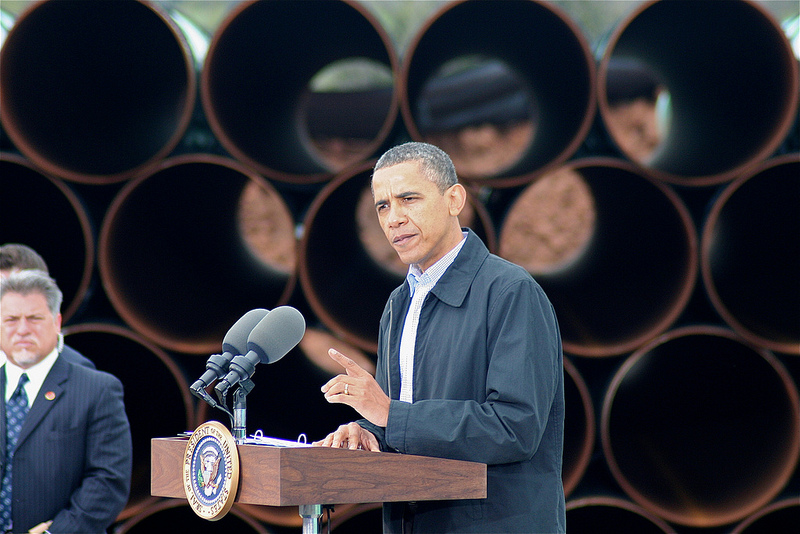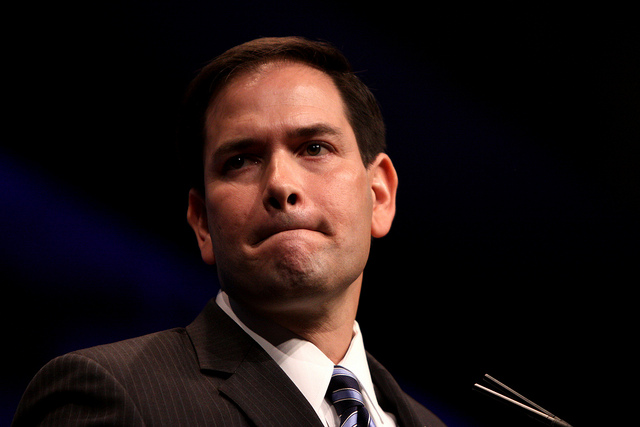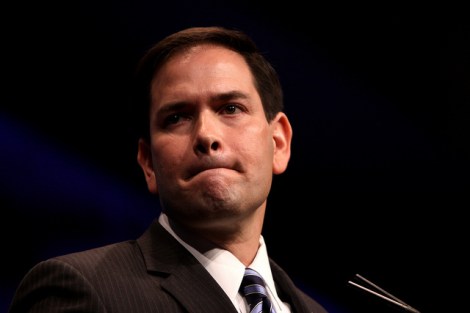Let’s talk about Sen. Marco Rubio (R-Fla.), Capitol Hill’s “it” guy in the same sense that Hollywood has marginally talented people whom it seizes upon and promotes until the next guy comes along. So here’s Rubio’s moment, maybe three years earlier than he would have hoped.
Earlier this week, Rubio sat down with BuzzFeed’s Ben Smith for a conversation about a range of topics. (The event was called “BuzzFeed Brews,” intending to be an informal two-guys-have-a-beer sort of thing. Rubio didn’t drink his beer.) At one point, Smith asked about climate change. Here’s the clip:
Rubio’s response?
Even if — anything that we would do on that would have a real impact on the economy and probably — if it’s only us doing it, a very negligible impact on the environment. Ultimately, if you look at the developing countries — which are not developing countries anymore; China, India, and others — they’re now the largest polluters in the world by far. So to the extent that that’s what you’re trying to get at, the United States is a country, not a planet.
On the other hand, if we unilaterally impose these things on our economy, you’re going to have a devastating impact on economics, depending on which measure it is we’re talking about. And I think that’s what, more than anything else, is standing in the way of doing anything on this. There has to be a cost-benefit analysis to every one of these principles that people are pushing on. And the benefit is difficult to justify when it’s just us doing it.
Smith follows up: Is climate change a threat to Florida? Rubio:
Well, first of all, the climate is always changing. That’s not the fundamental question. The fundamental question is whether man-made activity is what’s contributing most to it. I understand that people say there’s a significant scientific consensus on that issue, but I’ve actually seen reasonable debate on that principle. But beyond it, the secondary question is: Is there anything that government can do about that that will actually make a difference? In essence, we can pass a law that prohibits X, it has this dollar impact on our economy which is devastating, but what’s the benefit of it? Will it have a direct impact on actually turning around these climate changes that we’re trying to address? And that’s where I think this whole thing breaks down.
When you look at the cost-benefit analysis that’s being proposed, if you did all these things they’re talking about, what impact would it really have on these changes that we’re outlining? On the other hand, I can tell you the impact it would have on certain industries and on our economy, and that’s where it falls apart.
OK. Let’s start at the beginning.
Rubio’s first argument is that there’s no point in the United States doing anything since China and India are still polluting and those countries actually contribute more to greenhouse gas pollution than the U.S. It’s true that China produces the most CO2 in the world, but, on a per-capita basis, the U.S. exceeds it. Claiming that as a reason to do nothing is a bullshit, juvenile argument you’d hear from a 12-year-old: Why do I have to clean my room when my sister’s room is so dirty?
Moreover, this argument is a new staple of the right. We shouldn’t end subsidies to oil companies because it wouldn’t fix the deficit by itself. We shouldn’t curtail firearms because people will still die in other ways. We shouldn’t curb pollution because others pollute more.
We will concede his next point: The United States is not a planet.
He then argues that the climate is always changing and that there’s debate on the role we play in that change. The first point is correct; the second, not. Here’s how Phil Plait at Slate rebutted this.
The first thing Rubio said was, “Well, first of all, the climate is always changing.” And sure, that’s true … on a 10,000 year time scale. What we’re seeing in the past few decades is climate change on scale unprecedented since records have been kept, and extremely unusual even when compared to proxy records (tree ring data, for example, and measurements using ice cores) that go back millennia. Weather can change abruptly, year-to-year, but climate change as we’re seeing now is extremely rare, and generally catastrophic for many species alive at the time. …
There has been no reasonable debate, at least not from the deniers, who for the overwhelmingly most part are not climate scientists, who twist data, who leave out critical information, who use cherry-picked graphs, and who resort to outrageous ad hominems to cast doubt on the reality of global warming.
Rubio’s said similarly silly things in the past, including his line about what the government can or can’t do. But the argument most worth dissecting is his argument on economics.
What Rubio does is attack a straw man, demolishing an opponent that he created. He twice says that taking action on climate change would be “devastating”; multiple times he suggests that “cost-benefit analysis” doesn’t support acting to curb pollution.
Both of these claims are hollow nonsense. To the first point: What would be devastating, Senator? What policy would be “devastating” to the economy? At no point does Rubio identify what he’s talking about. Carbon tax? Limiting CO2 pollution? What? What “economics” will be destroyed by this phantom policy? Rubio’s goal isn’t to make an argument, it’s to make a diversion. He plants a bomb off to the side so he can point at it instead of talking policy.
Then there’s his ever-so-sober take on economic analysis. The benefits of fixing the climate must outweigh the costs, Rubio says. Professor Rubio wishes he could help, but the math just doesn’t add up. This is as phony as his “devastating” remarks. Just as Rubio has done no real assessment of the science behind climate change, he’s done no assessment of the economics. Rubio’s understanding of what climate change could do to the American economy — what it did last year in New York City! — is so shallow that he isn’t even concerned for his home state. The Environmental Defense Fund suggests that just one small part of the state’s economy, reef tourism, could be damaged irreparably by the changing ocean — to the tune of $5.5 billion. In Florida alone.
Rubio doesn’t care. His goal isn’t to fix the problem; it’s to be popular. If the GOP base wants to hear dismissals of science and puerile overviews of economics, Rubio will deliver. It’s fair to ask if Rubio believes his rhetoric on climate change. It’s also fair to assume that he does.
Wasn’t last year’s election supposed to usher in a new Republican party committed to embracing reality? If so, Marco Rubio is solidly a Republican in the 2012 vein. Whether that’s good enough for 2016 is a great question.




